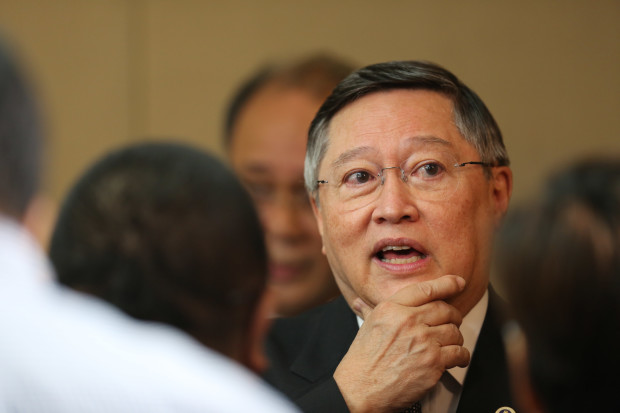The country’s economic managers on Monday backed the government’s tax reform package bill pending before the House of Representatives, calling the proposal the country’s “shield” and vaccine amid a possible economic slowdown.
Finance Secretary Carlos Dominguez III led a power house of President Rodrigo Duterte’s Cabinet secretaries who expressed their full support to the administration’s tax reform package that seeks to lower personal income tax, raise excise tax slapped on oil and vehicles, expand the value-added tax (VAT) base, among others.
READ: DOF files tax reform package, seeks reduction in income tax
“We are joined today by key members of the President’s Cabinet. This is a vivid demonstration of support for the tax package that is the keystone to the whole range of reforms this government intends to accomplish over the medium term,” Dominguez said during the hearing.
Dominguez said the tax reform package would serve as the country’s vaccine in a situation of a possible global economic slowdown due to China’s sluggish economy.
He said the tax reform package would keep the economy afloat by providing more jobs and building more infrastructure.
“The tax reform package is our immunization against a slowdown of the world economy. We will use the funds to accelerate our infrastructure program which will create jobs and will make our economy more competitive,” Dominguez said.
“Our economy is not as reliant as others in export… We will use this tax reform package precisely to stimulate our local economy,” he added.
READ: Dominguez allays fears on negative impact of auto excise tax hike
Socioeconomic planning Secretary Ernesto Pernia said the tax reform package would also serve as a “shield” against economic slowdown especially because the country’s economy is driven by domestic demand instead of exports.
He said the tax reform package that seeks to lower personal income tax would prop up the economy due to higher consumer demand.
“I would echo what Secretary Dominguez said. Our economy is not so much export driven, but domestic driven. And so, spending by government or by households would strengthen domestic demand, and exactly, that would the shield against the unfavorable winds in the global economy,” Pernia said.
Budget Secretary Benjamin Diokno said the country would become a more attractive investment hub if the tax reform package is passed.
“The tax reform is one of the things we have to do in order to make us competitive and make us an attractive place to invest,” Diokno said.
Former Finance Secretary Margarito Teves said he also supported the passage of the tax reform package “which seeks to make the tax system more equitable, generate more revenue to finance increasing needs as developing nation, and significantly reduce poverty in the country.”
Asked by lawmakers about the impact of a depreciating peso, Pernia said the weaker peso compared to the dollar may actually be beneficial to the country due to higher consumer spending brought about by higher overseas remittances.
READ: Peso hits 50:$1 level
“As the peso depreciates, overseas Filipino workers (OFW) families will have more money in their pockets they’ll use to consume,” Pernia said, adding that a higher consumer spending would result in higher value added tax (VAT) collection.
“So it’s a net gain. It’s actually more beneficial to us, I think,” he added.
READ: It’s official: VAT exemptions on senior citizens, PWDs retained
For his part, Dominguez said the peso is weakening compared to the dollar on the back of plans in the United States to increase interest rates.
“The dollars are migrating to the US and therefore, demand for pesos is slumping. That’s the main driver,” Dominguez said.
Dominguez allayed fears that the weak peso will have an adverse effect on the country’s economy.
“To a large extent, we cannot control the depreciation of the peso. What we’re trying to do is to prevent a momentum from developing that we might lose control over the rate change,” Dominguez said.
Other Cabinet Secretaries who attended the committee hearing to express support were Trade and Industry Secretary Ramon Lopez, Education Secretary Leonor Briones, Trade Secretary Arthur Tugade, and Public Works Secretary Mark Vilar. JE/rga
